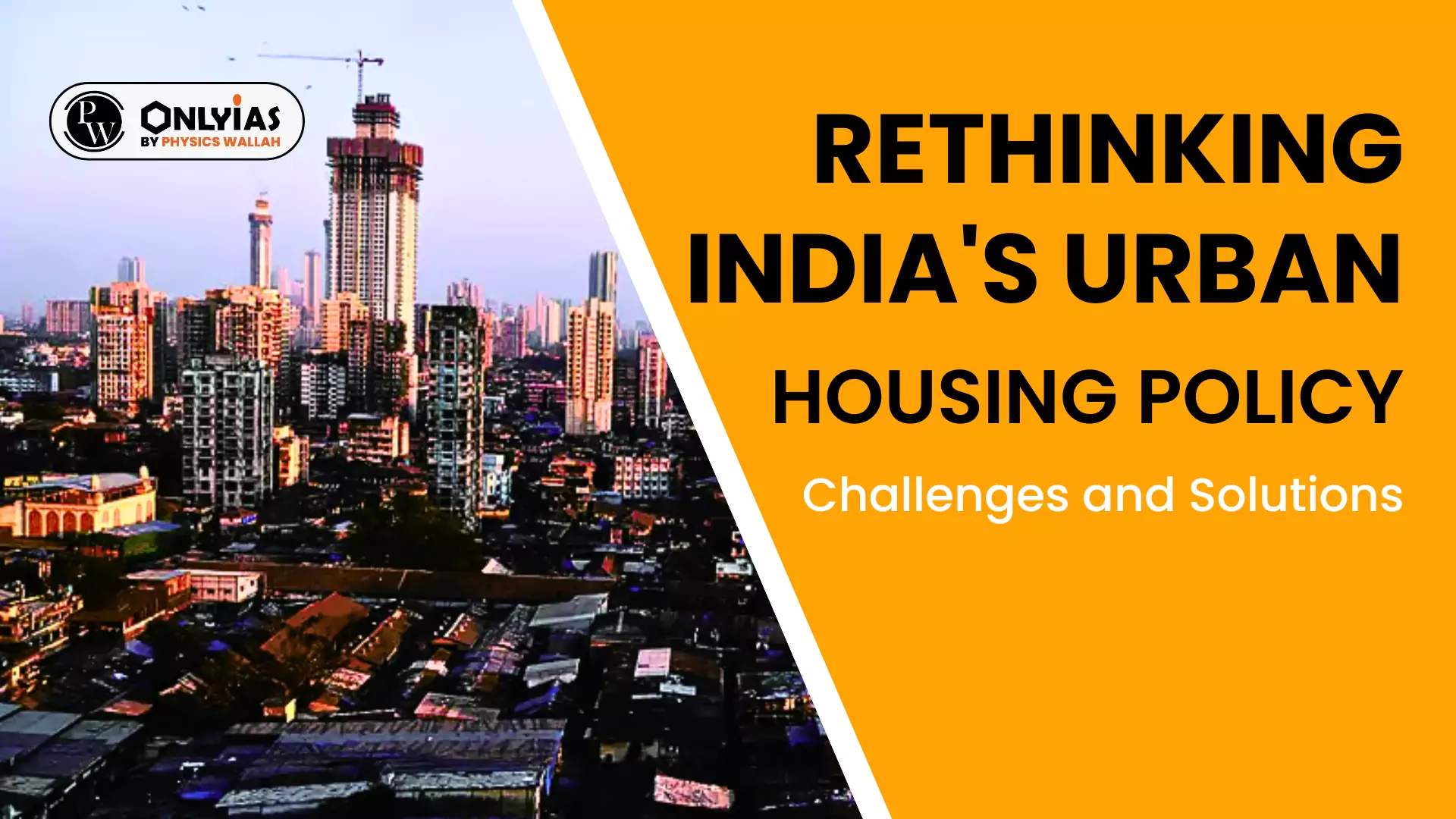Rethinking India’s Urban Housing Policy: Challenges and Solutions
The document titled “India’s Urban Housing Policy: Challenges and Solutions” provides a comprehensive analysis of the current state of urban housing in India, focusing on the systemic challenges that hinder effective housing delivery and accessibility. It outlines the evolution of housing policies, the socio-economic factors contributing to housing shortages, and potential solutions to improve urban housing conditions. By examining various case studies and policy frameworks, the report aims to present a holistic view of the urban housing landscape in India and suggest actionable strategies for addressing the pressing needs of urban populations.

Introduction
India is undergoing rapid urbanization, with an increasing number of people migrating to cities in search of better economic opportunities and living conditions. This demographic shift has led to a significant demand for housing, particularly in urban areas where infrastructure often struggles to keep pace with population growth. Despite various government initiatives aimed at providing affordable housing, many citizens continue to face challenges related to access, affordability, and quality of housing. The document highlights that approximately 18 million urban households are currently without adequate housing, underscoring the urgency of addressing these issues. By analyzing existing policies and their effectiveness, this report seeks to identify key challenges within India’s urban housing sector and propose solutions that can facilitate more inclusive and sustainable urban development.
Current Challenges in Urban Housing
The report identifies several critical challenges affecting urban housing in India:
- Affordability Crisis: Rapid increases in property prices have outpaced income growth for many urban residents. The lack of affordable housing options has forced low- and middle-income families into informal settlements or inadequate living conditions.
- Inadequate Infrastructure: Many urban areas lack essential infrastructure such as sanitation, clean water supply, and transportation networks. This deficiency not only affects living conditions but also limits economic opportunities for residents.
- Regulatory Barriers: Complex regulatory frameworks can hinder the development of new housing projects. Lengthy approval processes and bureaucratic red tape often delay construction timelines, exacerbating housing shortages.
- Informal Housing Sector: A significant portion of urban housing is provided through informal channels, leading to unregulated developments that do not meet safety or quality standards. This situation increases vulnerability for residents living in informal settlements.
- Displacement and Evictions: Urban redevelopment projects often lead to the displacement of low-income communities without adequate compensation or alternative housing options, further exacerbating social inequalities.
Policy Evolution
The document traces the evolution of India’s urban housing policies over the years:
- National Housing Policy (1994): This policy aimed to promote affordable housing through a multi-tiered approach involving central, state, and local governments. It emphasized the need for public-private partnerships to enhance housing delivery.
- National Urban Housing and Habitat Policy (2007): This policy shifted focus towards providing affordable housing for all, particularly targeting marginalized groups such as Scheduled Castes (SC), Scheduled Tribes (ST), and economically weaker sections (EWS).
- Pradhan Mantri Awas Yojana (PMAY): Launched in 2015, PMAY aims to provide affordable housing to the urban poor through subsidies and financial assistance for home construction or purchase.
Case Studies
The report includes various case studies that illustrate successful interventions in urban housing:
- Rajiv Awas Yojana: This initiative aimed at slum rehabilitation through community participation and provision of basic services alongside new housing units.
- Affordable Housing in Partnership Scheme: This program encourages collaboration between government agencies and private developers to create affordable housing projects that meet local needs.
- Jawaharlal Nehru National Urban Renewal Mission (JNNURM): Focused on improving urban infrastructure and services in selected cities, this mission has facilitated significant investments in housing projects.
Indian Urban Housing Policy – Proposed Solutions
To address the identified challenges, the document proposes several actionable solutions:
- Enhancing Affordability: Policies should focus on increasing the supply of affordable housing through incentives for developers who build low-cost units while ensuring access to financing for low-income families.
- Streamlining Regulations: Simplifying regulatory processes can expedite project approvals and encourage more developers to participate in affordable housing initiatives.
- Strengthening Infrastructure Development: Investments in infrastructure must accompany housing projects to ensure that new developments are sustainable and provide residents with necessary services.
- Promoting Community Engagement: Involving communities in planning processes can help tailor solutions to local needs while fostering a sense of ownership among residents.
- Leveraging Technology: Utilizing technology for better data collection and analysis can enhance decision-making in urban planning and policy formulation.
Conclusion
“India’s Urban Housing Policy: Challenges and Solutions” highlights the urgent need for comprehensive reforms within India’s urban housing sector to address ongoing challenges related to affordability, infrastructure, and regulatory barriers. As India continues to experience rapid urbanization, it is essential that policymakers adopt inclusive strategies that prioritize the needs of marginalized populations while promoting sustainable development practices. By implementing the proposed solutions outlined in this report, India can work towards creating a more equitable urban landscape that ensures safe, affordable, and adequate housing for all its citizens. Addressing these challenges is not only vital for individual well-being but also crucial for fostering social stability and economic growth within Indian society as a whole.
For further reading:
An Overview Of Housing Policies & Housing Finance In India impriindia
